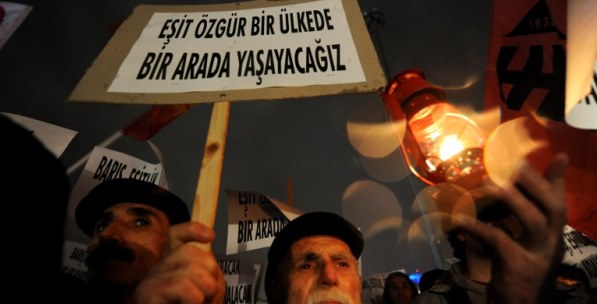It has been clear that authoritarianism will be the main topic on the agenda ahead of the forthcoming August 2014 presidential election and 2015 general elections. This discussion is not only a matter of the elites' power struggle in domestic politics but also in relation to Turkey's foreign policy agenda. Many Western capitals along with a number of foreign media outlets broadcast programs that accuse the ruling AK Party of authoritarianism.
Wikipedia lists Turkey as an example of authoritarian states. This shows the ultimate level of distortion of such media. Within the framework of democracy and authoritarianism debates, it is no more than an abdication of reason to count Turkey among authoritarian regimes such as Bahrain, Burkina Faso, Cambodia, Cuba, China, Laos as well as Syria. Or it may be the outcome of an anti-AK Party and anti-Erdoğan campaign. During his official visit to Turkey, Germany's President Joachim Gauck explained his anxieties about Turkey's lack of separation of powers and its tendency to restrict the rule of law.
Gauck, who was a politician under the totalitarian rule of a communist party until he was 50, justified his harsh criticism against Erdoğan's rule by saying he is an "advocator of democracy." It is highly ironic that Gauck's criticism coincides with Erdoğan's initiative on the Armenian issue, which was until now an unbroken taboo of Turkey. As one may remember, on April 23 Erdoğan stressed that the deportation of Armenians during World War I was inhumane, and he offered condolences to the descendants of those Armenian casualties.Erdoğan's call for "just memory" on the Armenian issue stands for Turkey's effort to confront its history on this 100-year-old issue. It is another irony that Erdoğan said during a speech at the AK Party's group meeting on Tuesday, "You will have no fear" when rejecting all types of ethnic and religious discrimination.
"Are you a Turk? You will have no fear. Are you a Kurd, Arab, Circassian, Laz, Georgian, Romani, Bosnian? You will have no fear. Are you Alevi or Sunni? You will have no fear. You will have no fear or shame because you perform prayers, observe fasts, recite Quran and wear hijab. You will have no fear and embarrassment because you speak in your mother tongue. You will have no fear or restraint in expressing your opinion, living as you wish and protecting your lifestyle," he said. Aside from these sentences, it is reported in the media that the AK Party's leader, who is condemned for authoritarianism, will launch initiatives on four other matters:Legalizing of Cemevis, re-opening the Halki Seminary, normalization in relations with Israel, and negotiating with pro-Gezi and liberal authors.
It is possible or maybe true to say that these initiatives are being launched to minimize internal polarization and recover Turkey's international image before the elections. It is natural for a politician to view democratization in light of elections. Contrary to popular belief, democratization does not come as an ideal and desire in most cases. Rather, it comes as satisfaction of necessities, demands and obligations. The outcomes of democratic initiatives and the physiological atmosphere they create are significant. Questioning the sincerity of politicians is not useful at all.
Here is a more critical question: How does the AK Party still continue to determine Turkey's reform and democratization agenda after 12 years of rule, despite being constantly charged with authoritarianism?
We can elaborate on the paradox in this way:
Erdoğan said he did not find the Constitutional Court's decision to unblock Twitter "national."
Now he presents a bold front to face the 1915 incidents and is subjected to severe criticism by Turkish nationalists. Erdoğan, who underlined the idea of "one nation, one state" several times is blamed for being a sympathizer of the PKK because of his Kurdish reconciliation initiative by Devlet Bahçeli, chairman of the Nationalist Movement Party (MHP).
How do discussions of aut









